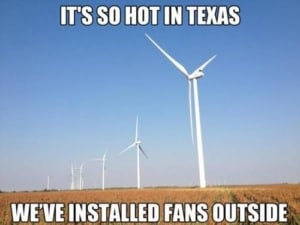Its Getting Hot in Here!
It is four o’clock in the afternoon and its 96 degrees outside. Its Hot! Let me ask you a question What do you do if your air conditioner stops working? Well first and foremost call Adam’s Air, We will get out to your home as soon as we can and hopefully be able to fix your system in a quick and easy way. But just in case we are loaded up with calls and you have to wait, here are 9 steps to keep cool in your home when your AC goes out, courtesy of
www.directenergy.com
1: Plan. Find out the weather report for the next few days to help you plan how to keep cool. Plan to avoid using the oven and use the microwave, instead. Always run the hood fan when cooking on the stove.
2: Keep you and your family well hydrated. Drink plenty of water or fruit juice. Avoid coffee, tea, and alcohol as these beverages are diuretics that remove moisture from your body. Wear lightweight, light colored, loose-fitting clothing.
3: Keep your house closed up and draw the curtains during the day. Don’t open windows because you’ll let in the outside humidity. If your air conditioner was running before it broke, the humidity level is still low, the air is dry, and your home is still cool. Don’t waste the cool.
4: Open windows and use window fans only after sunset. During the day, your home absorbs infrared heat from the sun. At night, it releases this heat through radiational cooling. Opening your windows and running fans at night to blow a cross breeze in your home will cool it faster.
5: Open your attic door and set up a fan to air up into your attic at night. This will pull cool air into your home and blow heated air out of the attic.
6: Get up early and close up your home before the temperature climbs. Your home will have cooled off during the night, so you’ll want to keep that cool air inside your home for as long as possible. Be sure to close all the curtains because outside heat will radiate through the window glass into your home.
7: Turn on your fans. Turning on ceiling fans and your ventilation system’s blower fan can help keep air circulating throughout your home. Moving air also feels cooler against your skin because it aids evaporation —your body’s natural cooling process. Close off the vents and air returns in the rooms you are not using. Heat will build in the upper storeys first so keep infants and the elderly on the ground floor (or basement) to keep cool.
8: Consider buying a dehumidifier. Drying the air inside your home will add to your comfort. Get one large enough to handle the largest room where your family spends most of its time. Turn it off at night or close up your bedroom and use it only in there.
9: Use fewer covers on your bed and take a cool shower before bedtime. This will help keep you cool and relax you as you fall asleep.
If you can’t take the heat…
If your home becomes too hot, go cool off at a swimming pool or take your family to the mall, go see a movie, or go eat out. Basically, get into some air conditioning until both your family and your home can cool down.



